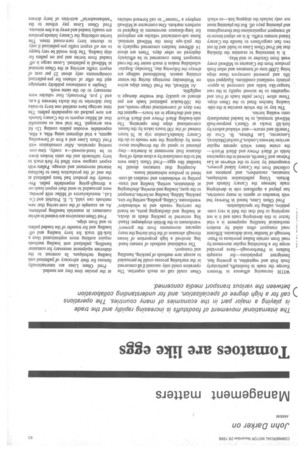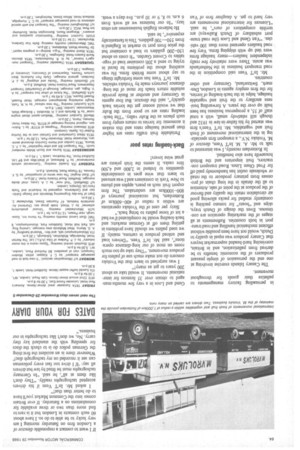Tomatoes are like eggs
Page 65

Page 66

If you've noticed an error in this article please click here to report it so we can fix it.
The international movement of foodstuffs is increasing rapidly and the trade is playing a major part in the economies of many countries. The operations ") call for a high degree of specialization, and for understanding collaboration between the various transport media concerned.
WITH increasing affluence in Western Europe the trade in foodstuffs, particularly fresh fruit and vegetables, is growing fast. Immigrant populations—for example Italians in Peterborough—have provided scope for a flourishing regular movement by road from certain Italian provinces to Peterborough of familiar local delicacies. Efficient road transport often aided by modern mechanical handling equipment is a vital factor in this developing trade and it is not surprising to find that the field is very competitive, calling for specialization.
Fred Olsen Lines, based in Norway but with branches or agents in many countries, has played a significant role in developing trade between the Canary Islands and Britain. Using palletization techniques, tomatoes, cucumbers, and potatoes are collected from the Canary Island growers, transported by lorry to the wharves at Las Palmas and Tenerife, stowed in the capacious holds of Black Prince and Black Watch— the cruise liners which operate regular services between London, Funchal (Madeira), Lanzarote, Las Palmas, St. Cruz de Tenerife and return—and whisked ashore by fork-lift trucks at Olsen's purpose-built Millwall terminal, to be loaded immediately onto waiting lorries.
The key to the whole exercise is the sideloading hatches fitted to the Olsen ships. These allow 15cwt pallet loads of fruit and vegetables to be stowed rapidly in the vast hangar-like holds and conveyed in appropriately ventilated conditions. Equipped with lifts and powered conveyors these ships bring 2,000 tons of tomatoes and other fresh produce from the Canaries to Millwall every week from October to mid-May.
It is interesting to examine the thinking that led Fred Olsen Lines to build and fit out two fast cargo/liners to handle the Canary Island tomato traffic. It is an object lesson to all transport organizations that thoroughness and planning pays off. But the planning must not only include the shipping link—in which Olsen could call on much expertise. The operation could only succeed if all concerned in the marketing process could be persuaded to accept new methods of packing, handling and transport.
The traditional methods of tomato handling involved a high proportion of losses through abrasion of the fruit during the many separate movements from the growers' warehouses to the British shopkeeper. Handling occurred in packing sheds at docks, at loading and discharging ports, on board the carrying vessels and in wholesalers' warehouses. Culling, grading, sorting for size, packing, lidding, loading on lorries, transport to the quay, loading and stowing, discharging at destination, sorting, loading and transporting to wholesalers and retailers all combined to produce substantial losses.
Accepting that tomatoes should be handled like eggs—Fred Olsen Lines were led to this conclusion by a close study of longdistance fruit movement in America—they planned to speed up the throughout movement by designing the new vessels to do the Canary Islands/London trip in 76 hours instead of the 100 hours taken by the fastest conventional ships then operating. The side-loading Black Prince and Black Watch load and discharge in six hours—against the two days of conventional cargo vessels, and the 100-basket palletized loads are put aboard so quickly that weather damage is negligible.
At Millwall, the Fred Olsen ships arrive on Wednesday mornings during the winter cruising season. Southbound sailings are always the following day, Thursday. Regular scheduling makes it much easier for the road transport fleets concerned to be efficiently deployed on other days. There are about 14 different hauliers concerned regularly in the pick-ups from the Millwall terminal. Some sub-contracted vehicles are employed for long-distance movements in England to northern markets. One contractor at Millwall employs a "runner" to call forward vehicles at the precise time they are needed.
Fred Olsen Lines are internationally famous for their advocacy of palletized unit loading techniques. In contrast to the elaborate equipment necessary for container handling, palletized unit loading methods require nothing more sophisticated than a fork-lift truck for lorry loading and offloading and for transfer of the loaded pallets to and from ships.
Fred Olsen executives are trained to advise customers in materials handling problems. As an example of the cost-saving that new methods can yield, L. E. Pritchitt and Co. Ltd., manufacturers of Millac milk powder, were persuaded to send their export loads on a through-going expendable pallet. Previously the product had been palletized at the end of the production lines to facilitate internal movement and storage. Pallets with export cargoes were lifted by fork-truck to lorry tailboards and the units broken down to be hand-stowed—a costly, time-consuming operation. After consultation with Fred Olsen Lines and a firm of forwarding agents, a trial shipment using 40in. x 48in. expendable wooden pallets costing 12s 6d was arranged. The trial was so successful that all Millac exports to the Canary Islands are now packed on expendable pallets. The time savings have enabled one lorry to make four deliveries to the docks between 8 a.m. and 5 p.m. Previously, four vehicles were necessary to do the same work.
Despite a continuous publicity campaign and the offer of rebates for pre-palletized consignments only about 25 per cent of export traffic arriving at the Olsen terminal at Millwall is palletized. Loose cargo is offloaded from lorries and put on pallets for ship loading. The firm would be very happy to see all export traffic pre-palletized if only to shorten lorry turn-round times. The lorries collecting the Canary Islands produce are usually loaded and away in a few minutes. Fred Olsen Lines pay tribute to the "ambassadorial" activities of lorry drivers
in persuading factory managements to palletize their goods for throughout movement.
The Canary Islands exercise involving at one end the persuasion of simple peasant producers of the economic benefits to be derived from palletization, and in Britain, convincing hard-headed supermarket buyers that Canary produce was equal in quality to Dutch, would not have been possible without efficient mechanical handling and road transport in both countries. Refinements at all stages of the marketing operation are continuous. Even the design of Dutch trays, skips and "boats" for tomato packing is congantly studied for packs allowing good air circulation retain the quality and flavour of the produce at the point of sale. Attention to all the details in the long chain of processes from primary producer to the retail or wholesale outlet has handsomely paid off for Fred Olsen Lines. Road transport contractors, fruit importers and the British housewife have also benefited.
In Rotterdam recently, I was interested to talk to Mr. A. M. In'T Veen, director of M. Vroluks N.Y., a transport firm specializing in the international movement of fresh fruit and vegetables. Mr. In'T Veen's firm was started by his father-in-law in 1932 and though still relatively small, with a total staff of 55, a prosperous business has been built up over the years. A forwarding business ancillary to the fruit and vegetable haulage, helps in the back-loading of lorries, for the firm employ agents in London, Denmark, Switzerland, Germany and other countries.
Mr. In'T Veen said competition in the road transport business in the Netherlands was acute. There were relatively few really independent hauliers—many haulage firms were tied up with shipping firms. Very few road hauliers operated more than 100 vehicles. "Van Gend and Loos (the road transport subsidiary of Dutch Railways) are terrible competitors of ours", he said. "Licences for international movements are very hard to get. A daughter firm of Van Gend and Loos in a very few months managed to obtain over 35 licences for international movements. It would take us about 200 years to get as many!"
I was surprised to learn that the Vroluks concern do not make much use of pallets for produce movement. "They take up too much room on most of our long-distance operations", said Mr. In'T Veen. "Drivers load and unload produce in cartons, mainly. If we used pallets we should have problems in getting them off at German markets; and back-loading would be complicated if we had a lot of loose pallets to bring back."
Sixty per cent of the Vroluks operations are within a radius of 400-600km of Rotterdam, but occasional journeys of 800-1000km are undertaken. The firm export fruit such as pears, apples and plums to New York in containers and I was amused to learn that wine goes in considerable quantities to Ireland in 2,800 and 4,500 litre casks. It seems the Irish priests are great wine lovers!
Back-loading rates poor
Perishable fruit traffic rates are higher than general haulage rates and this makes it economic for lorries to return empty from such places as the Ruhr valley. "The backloading rates are so poor from the Ruhr that we would sooner get the lorries back quickly", said the director. But four agents in Germany and another at Basle provide suitable return loads for most of the longdistance journeys made by Vroluks vehicles.
Mr. In'T Veen has some forthright things to say about some British firms. He was scathing about the problems he faced in trying to send a 20ft container load of vegetables to Covent Garden. "It costs us about 150-200 guilders to load a container but the price from port to market in England is from 550-700 guilders. This is fantastically expensive", he said.
He believes English businessmen are often lazy. "In our business we all work from 6 am. to 8, 9 or 10 p.m., five days a week. If I want to contact a responsible director of a London firm on Saturday morning I am very lucky to be able to do so. I have about 60 such contacts in London but it is rare to find more than two or three available for consultations on a Saturday. If ever Britain comes into the Common Market you'll have to do better than that!"
I asked Mr. In'T Veen if his drivers accepted tachographs readily. "They don't like them at all", he said. "In Germany tachographs must be fitted by law but drivers all say: 'If I drive too fast every policeman can see it-recorded on my tachograph disc!' Whenever there is an accident the first thing the German police do is to check the discs for speeding with the standard key they carry. No, we don't like tachographs in our business."




















































































































